Cross-Cultural Analysis Report: Tesco's Brazil Market Entry Strategies
VerifiedAdded on 2023/01/17
|11
|3909
|91
Report
AI Summary
This report provides a cross-cultural analysis of Tesco's planned market entry into Brazil, examining the influence of cultural factors on its marketing operations. It utilizes Hofstede's cultural model to compare the UK and Brazilian cultures across power distance, individualism, masculinity, uncertainty avoidance, long-term orientation, and indulgence. The report further explores the implications of these cultural dimensions on Tesco's marketing mix, including product, price, place, promotion, physical evidence, and people. Finally, it discusses market entry strategies, offering insights into how Tesco can adapt its approach to succeed in the Brazilian retail market. The analysis emphasizes understanding cultural differences to tailor services and products effectively, ensuring successful global expansion for the company.

1
Paraphrase This Document
Need a fresh take? Get an instant paraphrase of this document with our AI Paraphraser
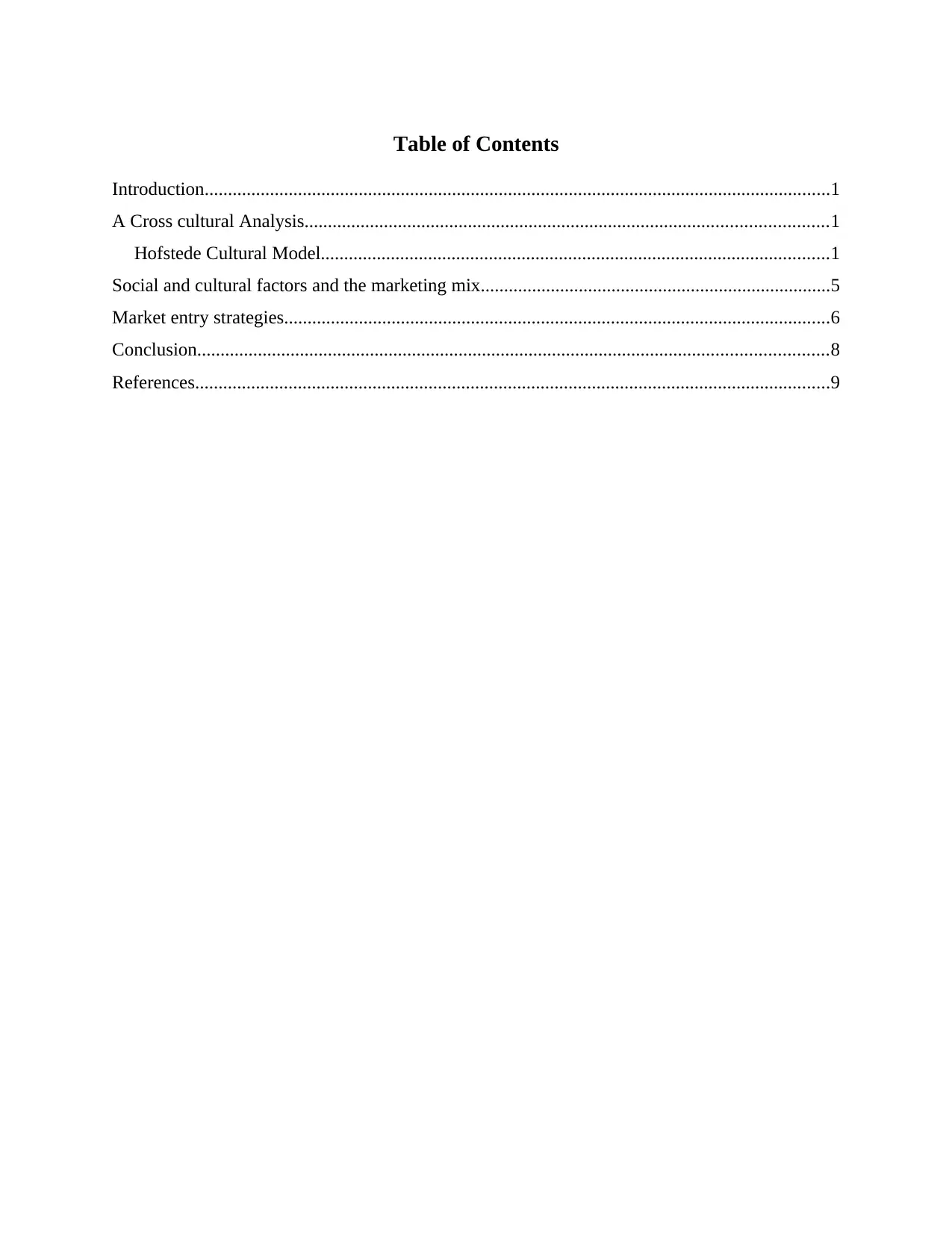
Table of Contents
Introduction......................................................................................................................................1
A Cross cultural Analysis................................................................................................................1
Hofstede Cultural Model.............................................................................................................1
Social and cultural factors and the marketing mix...........................................................................5
Market entry strategies.....................................................................................................................6
Conclusion.......................................................................................................................................8
References........................................................................................................................................9
Introduction......................................................................................................................................1
A Cross cultural Analysis................................................................................................................1
Hofstede Cultural Model.............................................................................................................1
Social and cultural factors and the marketing mix...........................................................................5
Market entry strategies.....................................................................................................................6
Conclusion.......................................................................................................................................8
References........................................................................................................................................9
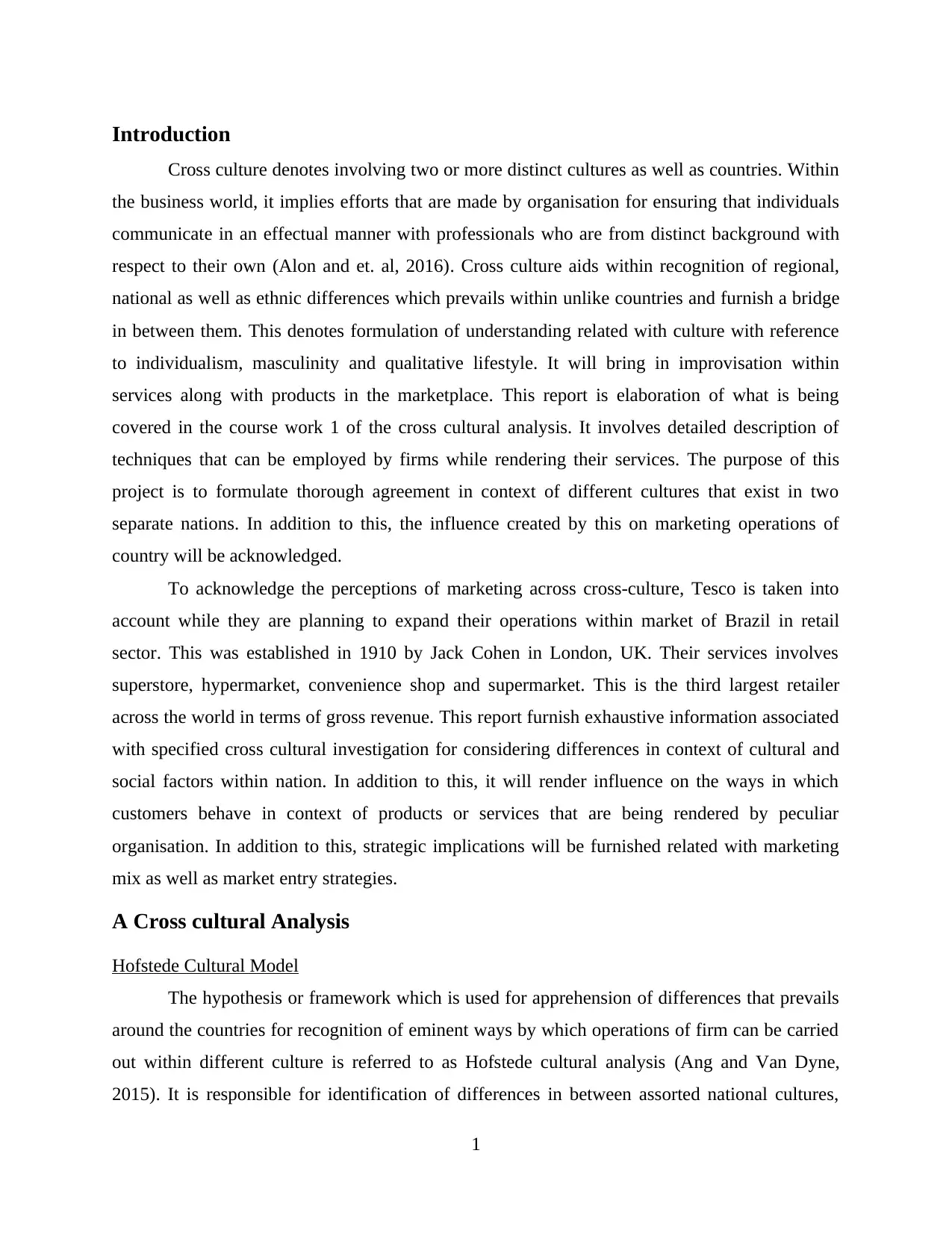
Introduction
Cross culture denotes involving two or more distinct cultures as well as countries. Within
the business world, it implies efforts that are made by organisation for ensuring that individuals
communicate in an effectual manner with professionals who are from distinct background with
respect to their own (Alon and et. al, 2016). Cross culture aids within recognition of regional,
national as well as ethnic differences which prevails within unlike countries and furnish a bridge
in between them. This denotes formulation of understanding related with culture with reference
to individualism, masculinity and qualitative lifestyle. It will bring in improvisation within
services along with products in the marketplace. This report is elaboration of what is being
covered in the course work 1 of the cross cultural analysis. It involves detailed description of
techniques that can be employed by firms while rendering their services. The purpose of this
project is to formulate thorough agreement in context of different cultures that exist in two
separate nations. In addition to this, the influence created by this on marketing operations of
country will be acknowledged.
To acknowledge the perceptions of marketing across cross-culture, Tesco is taken into
account while they are planning to expand their operations within market of Brazil in retail
sector. This was established in 1910 by Jack Cohen in London, UK. Their services involves
superstore, hypermarket, convenience shop and supermarket. This is the third largest retailer
across the world in terms of gross revenue. This report furnish exhaustive information associated
with specified cross cultural investigation for considering differences in context of cultural and
social factors within nation. In addition to this, it will render influence on the ways in which
customers behave in context of products or services that are being rendered by peculiar
organisation. In addition to this, strategic implications will be furnished related with marketing
mix as well as market entry strategies.
A Cross cultural Analysis
Hofstede Cultural Model
The hypothesis or framework which is used for apprehension of differences that prevails
around the countries for recognition of eminent ways by which operations of firm can be carried
out within different culture is referred to as Hofstede cultural analysis (Ang and Van Dyne,
2015). It is responsible for identification of differences in between assorted national cultures,
1
Cross culture denotes involving two or more distinct cultures as well as countries. Within
the business world, it implies efforts that are made by organisation for ensuring that individuals
communicate in an effectual manner with professionals who are from distinct background with
respect to their own (Alon and et. al, 2016). Cross culture aids within recognition of regional,
national as well as ethnic differences which prevails within unlike countries and furnish a bridge
in between them. This denotes formulation of understanding related with culture with reference
to individualism, masculinity and qualitative lifestyle. It will bring in improvisation within
services along with products in the marketplace. This report is elaboration of what is being
covered in the course work 1 of the cross cultural analysis. It involves detailed description of
techniques that can be employed by firms while rendering their services. The purpose of this
project is to formulate thorough agreement in context of different cultures that exist in two
separate nations. In addition to this, the influence created by this on marketing operations of
country will be acknowledged.
To acknowledge the perceptions of marketing across cross-culture, Tesco is taken into
account while they are planning to expand their operations within market of Brazil in retail
sector. This was established in 1910 by Jack Cohen in London, UK. Their services involves
superstore, hypermarket, convenience shop and supermarket. This is the third largest retailer
across the world in terms of gross revenue. This report furnish exhaustive information associated
with specified cross cultural investigation for considering differences in context of cultural and
social factors within nation. In addition to this, it will render influence on the ways in which
customers behave in context of products or services that are being rendered by peculiar
organisation. In addition to this, strategic implications will be furnished related with marketing
mix as well as market entry strategies.
A Cross cultural Analysis
Hofstede Cultural Model
The hypothesis or framework which is used for apprehension of differences that prevails
around the countries for recognition of eminent ways by which operations of firm can be carried
out within different culture is referred to as Hofstede cultural analysis (Ang and Van Dyne,
2015). It is responsible for identification of differences in between assorted national cultures,
1
⊘ This is a preview!⊘
Do you want full access?
Subscribe today to unlock all pages.

Trusted by 1+ million students worldwide
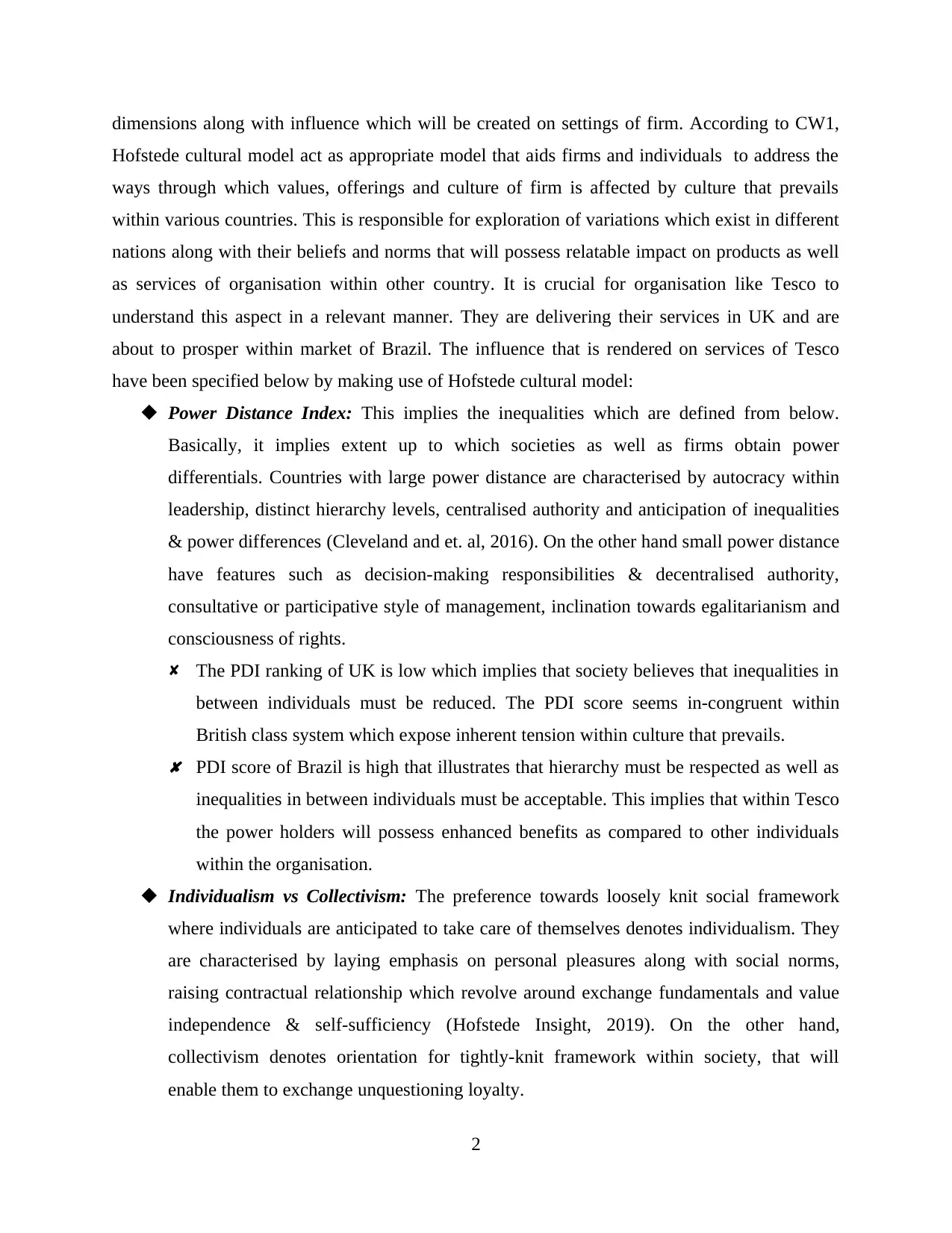
dimensions along with influence which will be created on settings of firm. According to CW1,
Hofstede cultural model act as appropriate model that aids firms and individuals to address the
ways through which values, offerings and culture of firm is affected by culture that prevails
within various countries. This is responsible for exploration of variations which exist in different
nations along with their beliefs and norms that will possess relatable impact on products as well
as services of organisation within other country. It is crucial for organisation like Tesco to
understand this aspect in a relevant manner. They are delivering their services in UK and are
about to prosper within market of Brazil. The influence that is rendered on services of Tesco
have been specified below by making use of Hofstede cultural model:
Power Distance Index: This implies the inequalities which are defined from below.
Basically, it implies extent up to which societies as well as firms obtain power
differentials. Countries with large power distance are characterised by autocracy within
leadership, distinct hierarchy levels, centralised authority and anticipation of inequalities
& power differences (Cleveland and et. al, 2016). On the other hand small power distance
have features such as decision-making responsibilities & decentralised authority,
consultative or participative style of management, inclination towards egalitarianism and
consciousness of rights.
The PDI ranking of UK is low which implies that society believes that inequalities in
between individuals must be reduced. The PDI score seems in-congruent within
British class system which expose inherent tension within culture that prevails.
PDI score of Brazil is high that illustrates that hierarchy must be respected as well as
inequalities in between individuals must be acceptable. This implies that within Tesco
the power holders will possess enhanced benefits as compared to other individuals
within the organisation.
Individualism vs Collectivism: The preference towards loosely knit social framework
where individuals are anticipated to take care of themselves denotes individualism. They
are characterised by laying emphasis on personal pleasures along with social norms,
raising contractual relationship which revolve around exchange fundamentals and value
independence & self-sufficiency (Hofstede Insight, 2019). On the other hand,
collectivism denotes orientation for tightly-knit framework within society, that will
enable them to exchange unquestioning loyalty.
2
Hofstede cultural model act as appropriate model that aids firms and individuals to address the
ways through which values, offerings and culture of firm is affected by culture that prevails
within various countries. This is responsible for exploration of variations which exist in different
nations along with their beliefs and norms that will possess relatable impact on products as well
as services of organisation within other country. It is crucial for organisation like Tesco to
understand this aspect in a relevant manner. They are delivering their services in UK and are
about to prosper within market of Brazil. The influence that is rendered on services of Tesco
have been specified below by making use of Hofstede cultural model:
Power Distance Index: This implies the inequalities which are defined from below.
Basically, it implies extent up to which societies as well as firms obtain power
differentials. Countries with large power distance are characterised by autocracy within
leadership, distinct hierarchy levels, centralised authority and anticipation of inequalities
& power differences (Cleveland and et. al, 2016). On the other hand small power distance
have features such as decision-making responsibilities & decentralised authority,
consultative or participative style of management, inclination towards egalitarianism and
consciousness of rights.
The PDI ranking of UK is low which implies that society believes that inequalities in
between individuals must be reduced. The PDI score seems in-congruent within
British class system which expose inherent tension within culture that prevails.
PDI score of Brazil is high that illustrates that hierarchy must be respected as well as
inequalities in between individuals must be acceptable. This implies that within Tesco
the power holders will possess enhanced benefits as compared to other individuals
within the organisation.
Individualism vs Collectivism: The preference towards loosely knit social framework
where individuals are anticipated to take care of themselves denotes individualism. They
are characterised by laying emphasis on personal pleasures along with social norms,
raising contractual relationship which revolve around exchange fundamentals and value
independence & self-sufficiency (Hofstede Insight, 2019). On the other hand,
collectivism denotes orientation for tightly-knit framework within society, that will
enable them to exchange unquestioning loyalty.
2
Paraphrase This Document
Need a fresh take? Get an instant paraphrase of this document with our AI Paraphraser
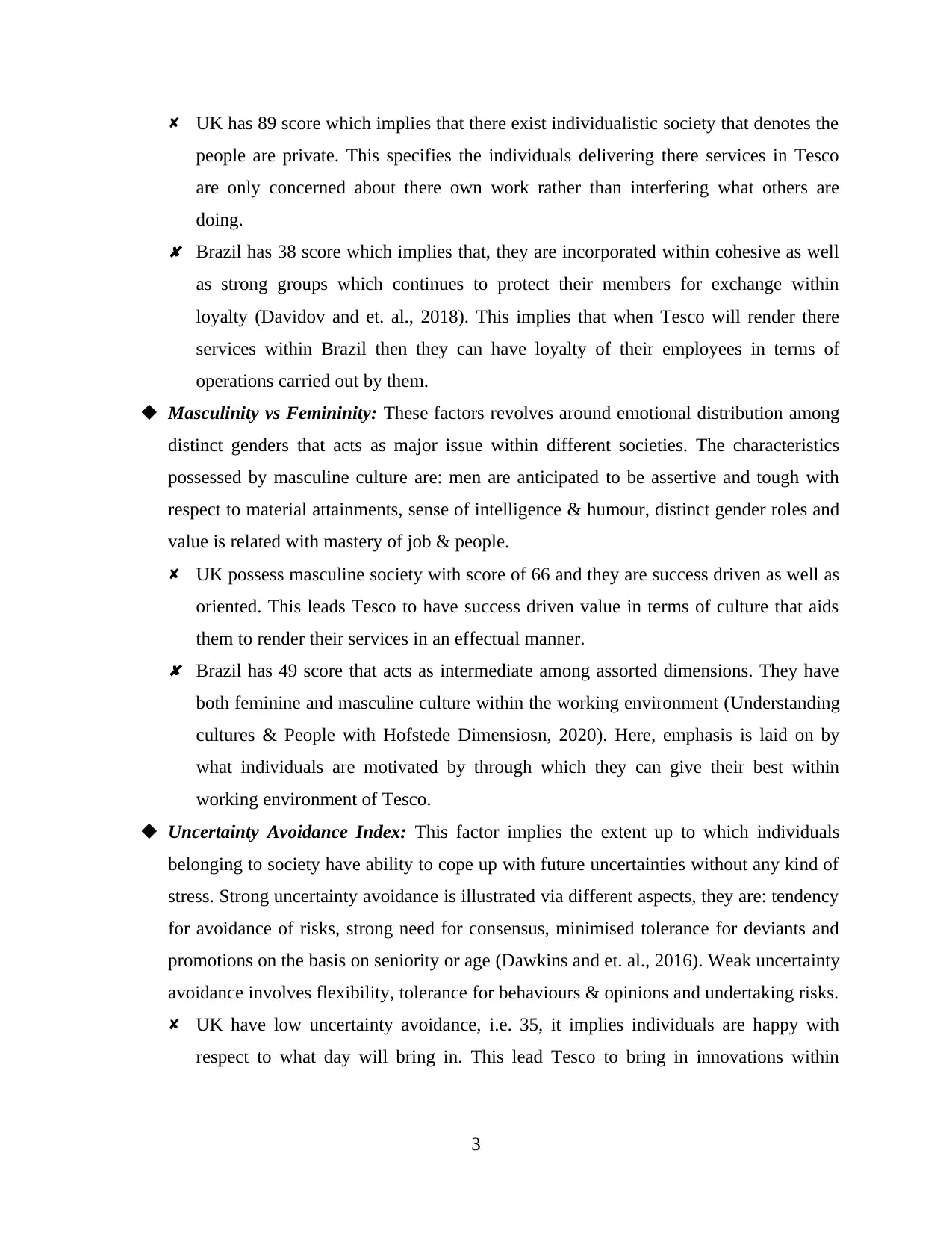
UK has 89 score which implies that there exist individualistic society that denotes the
people are private. This specifies the individuals delivering there services in Tesco
are only concerned about there own work rather than interfering what others are
doing.
Brazil has 38 score which implies that, they are incorporated within cohesive as well
as strong groups which continues to protect their members for exchange within
loyalty (Davidov and et. al., 2018). This implies that when Tesco will render there
services within Brazil then they can have loyalty of their employees in terms of
operations carried out by them.
Masculinity vs Femininity: These factors revolves around emotional distribution among
distinct genders that acts as major issue within different societies. The characteristics
possessed by masculine culture are: men are anticipated to be assertive and tough with
respect to material attainments, sense of intelligence & humour, distinct gender roles and
value is related with mastery of job & people.
UK possess masculine society with score of 66 and they are success driven as well as
oriented. This leads Tesco to have success driven value in terms of culture that aids
them to render their services in an effectual manner.
Brazil has 49 score that acts as intermediate among assorted dimensions. They have
both feminine and masculine culture within the working environment (Understanding
cultures & People with Hofstede Dimensiosn, 2020). Here, emphasis is laid on by
what individuals are motivated by through which they can give their best within
working environment of Tesco.
Uncertainty Avoidance Index: This factor implies the extent up to which individuals
belonging to society have ability to cope up with future uncertainties without any kind of
stress. Strong uncertainty avoidance is illustrated via different aspects, they are: tendency
for avoidance of risks, strong need for consensus, minimised tolerance for deviants and
promotions on the basis on seniority or age (Dawkins and et. al., 2016). Weak uncertainty
avoidance involves flexibility, tolerance for behaviours & opinions and undertaking risks.
UK have low uncertainty avoidance, i.e. 35, it implies individuals are happy with
respect to what day will bring in. This lead Tesco to bring in innovations within
3
people are private. This specifies the individuals delivering there services in Tesco
are only concerned about there own work rather than interfering what others are
doing.
Brazil has 38 score which implies that, they are incorporated within cohesive as well
as strong groups which continues to protect their members for exchange within
loyalty (Davidov and et. al., 2018). This implies that when Tesco will render there
services within Brazil then they can have loyalty of their employees in terms of
operations carried out by them.
Masculinity vs Femininity: These factors revolves around emotional distribution among
distinct genders that acts as major issue within different societies. The characteristics
possessed by masculine culture are: men are anticipated to be assertive and tough with
respect to material attainments, sense of intelligence & humour, distinct gender roles and
value is related with mastery of job & people.
UK possess masculine society with score of 66 and they are success driven as well as
oriented. This leads Tesco to have success driven value in terms of culture that aids
them to render their services in an effectual manner.
Brazil has 49 score that acts as intermediate among assorted dimensions. They have
both feminine and masculine culture within the working environment (Understanding
cultures & People with Hofstede Dimensiosn, 2020). Here, emphasis is laid on by
what individuals are motivated by through which they can give their best within
working environment of Tesco.
Uncertainty Avoidance Index: This factor implies the extent up to which individuals
belonging to society have ability to cope up with future uncertainties without any kind of
stress. Strong uncertainty avoidance is illustrated via different aspects, they are: tendency
for avoidance of risks, strong need for consensus, minimised tolerance for deviants and
promotions on the basis on seniority or age (Dawkins and et. al., 2016). Weak uncertainty
avoidance involves flexibility, tolerance for behaviours & opinions and undertaking risks.
UK have low uncertainty avoidance, i.e. 35, it implies individuals are happy with
respect to what day will bring in. This lead Tesco to bring in innovations within
3
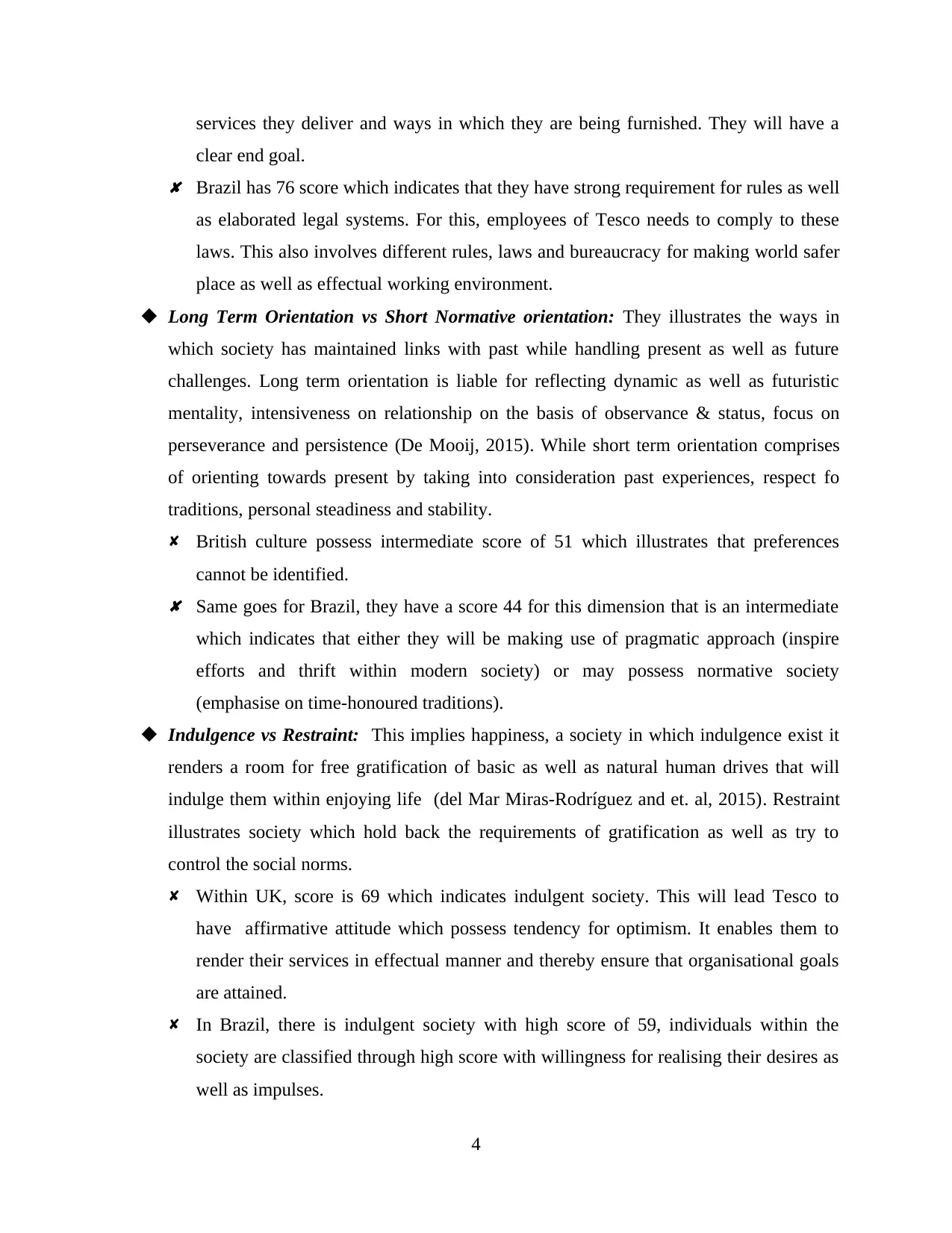
services they deliver and ways in which they are being furnished. They will have a
clear end goal.
Brazil has 76 score which indicates that they have strong requirement for rules as well
as elaborated legal systems. For this, employees of Tesco needs to comply to these
laws. This also involves different rules, laws and bureaucracy for making world safer
place as well as effectual working environment.
Long Term Orientation vs Short Normative orientation: They illustrates the ways in
which society has maintained links with past while handling present as well as future
challenges. Long term orientation is liable for reflecting dynamic as well as futuristic
mentality, intensiveness on relationship on the basis of observance & status, focus on
perseverance and persistence (De Mooij, 2015). While short term orientation comprises
of orienting towards present by taking into consideration past experiences, respect fo
traditions, personal steadiness and stability.
British culture possess intermediate score of 51 which illustrates that preferences
cannot be identified.
Same goes for Brazil, they have a score 44 for this dimension that is an intermediate
which indicates that either they will be making use of pragmatic approach (inspire
efforts and thrift within modern society) or may possess normative society
(emphasise on time-honoured traditions).
Indulgence vs Restraint: This implies happiness, a society in which indulgence exist it
renders a room for free gratification of basic as well as natural human drives that will
indulge them within enjoying life (del Mar Miras‐Rodríguez and et. al, 2015). Restraint
illustrates society which hold back the requirements of gratification as well as try to
control the social norms.
Within UK, score is 69 which indicates indulgent society. This will lead Tesco to
have affirmative attitude which possess tendency for optimism. It enables them to
render their services in effectual manner and thereby ensure that organisational goals
are attained.
In Brazil, there is indulgent society with high score of 59, individuals within the
society are classified through high score with willingness for realising their desires as
well as impulses.
4
clear end goal.
Brazil has 76 score which indicates that they have strong requirement for rules as well
as elaborated legal systems. For this, employees of Tesco needs to comply to these
laws. This also involves different rules, laws and bureaucracy for making world safer
place as well as effectual working environment.
Long Term Orientation vs Short Normative orientation: They illustrates the ways in
which society has maintained links with past while handling present as well as future
challenges. Long term orientation is liable for reflecting dynamic as well as futuristic
mentality, intensiveness on relationship on the basis of observance & status, focus on
perseverance and persistence (De Mooij, 2015). While short term orientation comprises
of orienting towards present by taking into consideration past experiences, respect fo
traditions, personal steadiness and stability.
British culture possess intermediate score of 51 which illustrates that preferences
cannot be identified.
Same goes for Brazil, they have a score 44 for this dimension that is an intermediate
which indicates that either they will be making use of pragmatic approach (inspire
efforts and thrift within modern society) or may possess normative society
(emphasise on time-honoured traditions).
Indulgence vs Restraint: This implies happiness, a society in which indulgence exist it
renders a room for free gratification of basic as well as natural human drives that will
indulge them within enjoying life (del Mar Miras‐Rodríguez and et. al, 2015). Restraint
illustrates society which hold back the requirements of gratification as well as try to
control the social norms.
Within UK, score is 69 which indicates indulgent society. This will lead Tesco to
have affirmative attitude which possess tendency for optimism. It enables them to
render their services in effectual manner and thereby ensure that organisational goals
are attained.
In Brazil, there is indulgent society with high score of 59, individuals within the
society are classified through high score with willingness for realising their desires as
well as impulses.
4
⊘ This is a preview!⊘
Do you want full access?
Subscribe today to unlock all pages.

Trusted by 1+ million students worldwide
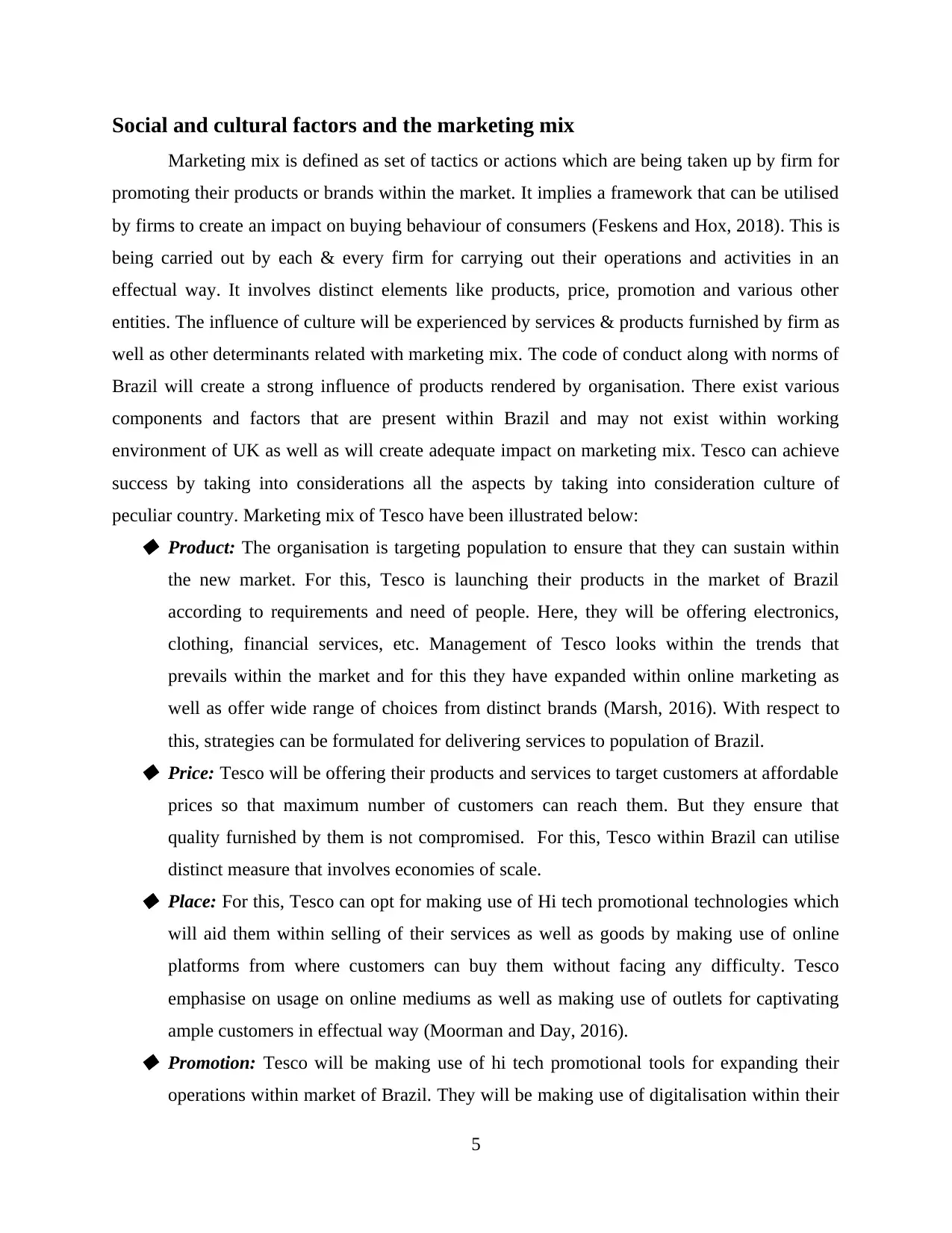
Social and cultural factors and the marketing mix
Marketing mix is defined as set of tactics or actions which are being taken up by firm for
promoting their products or brands within the market. It implies a framework that can be utilised
by firms to create an impact on buying behaviour of consumers (Feskens and Hox, 2018). This is
being carried out by each & every firm for carrying out their operations and activities in an
effectual way. It involves distinct elements like products, price, promotion and various other
entities. The influence of culture will be experienced by services & products furnished by firm as
well as other determinants related with marketing mix. The code of conduct along with norms of
Brazil will create a strong influence of products rendered by organisation. There exist various
components and factors that are present within Brazil and may not exist within working
environment of UK as well as will create adequate impact on marketing mix. Tesco can achieve
success by taking into considerations all the aspects by taking into consideration culture of
peculiar country. Marketing mix of Tesco have been illustrated below: Product: The organisation is targeting population to ensure that they can sustain within
the new market. For this, Tesco is launching their products in the market of Brazil
according to requirements and need of people. Here, they will be offering electronics,
clothing, financial services, etc. Management of Tesco looks within the trends that
prevails within the market and for this they have expanded within online marketing as
well as offer wide range of choices from distinct brands (Marsh, 2016). With respect to
this, strategies can be formulated for delivering services to population of Brazil. Price: Tesco will be offering their products and services to target customers at affordable
prices so that maximum number of customers can reach them. But they ensure that
quality furnished by them is not compromised. For this, Tesco within Brazil can utilise
distinct measure that involves economies of scale. Place: For this, Tesco can opt for making use of Hi tech promotional technologies which
will aid them within selling of their services as well as goods by making use of online
platforms from where customers can buy them without facing any difficulty. Tesco
emphasise on usage on online mediums as well as making use of outlets for captivating
ample customers in effectual way (Moorman and Day, 2016). Promotion: Tesco will be making use of hi tech promotional tools for expanding their
operations within market of Brazil. They will be making use of digitalisation within their
5
Marketing mix is defined as set of tactics or actions which are being taken up by firm for
promoting their products or brands within the market. It implies a framework that can be utilised
by firms to create an impact on buying behaviour of consumers (Feskens and Hox, 2018). This is
being carried out by each & every firm for carrying out their operations and activities in an
effectual way. It involves distinct elements like products, price, promotion and various other
entities. The influence of culture will be experienced by services & products furnished by firm as
well as other determinants related with marketing mix. The code of conduct along with norms of
Brazil will create a strong influence of products rendered by organisation. There exist various
components and factors that are present within Brazil and may not exist within working
environment of UK as well as will create adequate impact on marketing mix. Tesco can achieve
success by taking into considerations all the aspects by taking into consideration culture of
peculiar country. Marketing mix of Tesco have been illustrated below: Product: The organisation is targeting population to ensure that they can sustain within
the new market. For this, Tesco is launching their products in the market of Brazil
according to requirements and need of people. Here, they will be offering electronics,
clothing, financial services, etc. Management of Tesco looks within the trends that
prevails within the market and for this they have expanded within online marketing as
well as offer wide range of choices from distinct brands (Marsh, 2016). With respect to
this, strategies can be formulated for delivering services to population of Brazil. Price: Tesco will be offering their products and services to target customers at affordable
prices so that maximum number of customers can reach them. But they ensure that
quality furnished by them is not compromised. For this, Tesco within Brazil can utilise
distinct measure that involves economies of scale. Place: For this, Tesco can opt for making use of Hi tech promotional technologies which
will aid them within selling of their services as well as goods by making use of online
platforms from where customers can buy them without facing any difficulty. Tesco
emphasise on usage on online mediums as well as making use of outlets for captivating
ample customers in effectual way (Moorman and Day, 2016). Promotion: Tesco will be making use of hi tech promotional tools for expanding their
operations within market of Brazil. They will be making use of digitalisation within their
5
Paraphrase This Document
Need a fresh take? Get an instant paraphrase of this document with our AI Paraphraser
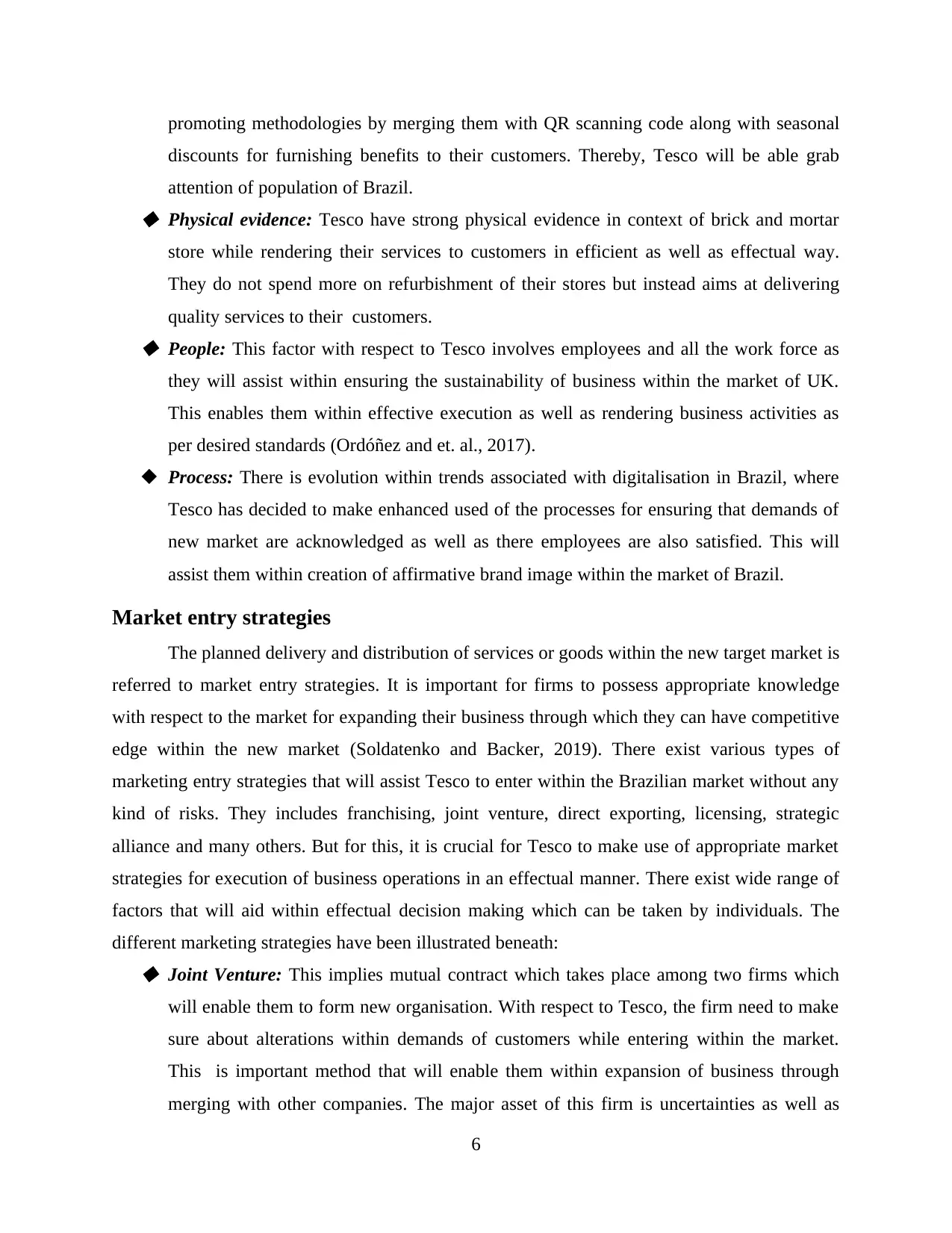
promoting methodologies by merging them with QR scanning code along with seasonal
discounts for furnishing benefits to their customers. Thereby, Tesco will be able grab
attention of population of Brazil. Physical evidence: Tesco have strong physical evidence in context of brick and mortar
store while rendering their services to customers in efficient as well as effectual way.
They do not spend more on refurbishment of their stores but instead aims at delivering
quality services to their customers. People: This factor with respect to Tesco involves employees and all the work force as
they will assist within ensuring the sustainability of business within the market of UK.
This enables them within effective execution as well as rendering business activities as
per desired standards (Ordóñez and et. al., 2017).
Process: There is evolution within trends associated with digitalisation in Brazil, where
Tesco has decided to make enhanced used of the processes for ensuring that demands of
new market are acknowledged as well as there employees are also satisfied. This will
assist them within creation of affirmative brand image within the market of Brazil.
Market entry strategies
The planned delivery and distribution of services or goods within the new target market is
referred to market entry strategies. It is important for firms to possess appropriate knowledge
with respect to the market for expanding their business through which they can have competitive
edge within the new market (Soldatenko and Backer, 2019). There exist various types of
marketing entry strategies that will assist Tesco to enter within the Brazilian market without any
kind of risks. They includes franchising, joint venture, direct exporting, licensing, strategic
alliance and many others. But for this, it is crucial for Tesco to make use of appropriate market
strategies for execution of business operations in an effectual manner. There exist wide range of
factors that will aid within effectual decision making which can be taken by individuals. The
different marketing strategies have been illustrated beneath: Joint Venture: This implies mutual contract which takes place among two firms which
will enable them to form new organisation. With respect to Tesco, the firm need to make
sure about alterations within demands of customers while entering within the market.
This is important method that will enable them within expansion of business through
merging with other companies. The major asset of this firm is uncertainties as well as
6
discounts for furnishing benefits to their customers. Thereby, Tesco will be able grab
attention of population of Brazil. Physical evidence: Tesco have strong physical evidence in context of brick and mortar
store while rendering their services to customers in efficient as well as effectual way.
They do not spend more on refurbishment of their stores but instead aims at delivering
quality services to their customers. People: This factor with respect to Tesco involves employees and all the work force as
they will assist within ensuring the sustainability of business within the market of UK.
This enables them within effective execution as well as rendering business activities as
per desired standards (Ordóñez and et. al., 2017).
Process: There is evolution within trends associated with digitalisation in Brazil, where
Tesco has decided to make enhanced used of the processes for ensuring that demands of
new market are acknowledged as well as there employees are also satisfied. This will
assist them within creation of affirmative brand image within the market of Brazil.
Market entry strategies
The planned delivery and distribution of services or goods within the new target market is
referred to market entry strategies. It is important for firms to possess appropriate knowledge
with respect to the market for expanding their business through which they can have competitive
edge within the new market (Soldatenko and Backer, 2019). There exist various types of
marketing entry strategies that will assist Tesco to enter within the Brazilian market without any
kind of risks. They includes franchising, joint venture, direct exporting, licensing, strategic
alliance and many others. But for this, it is crucial for Tesco to make use of appropriate market
strategies for execution of business operations in an effectual manner. There exist wide range of
factors that will aid within effectual decision making which can be taken by individuals. The
different marketing strategies have been illustrated beneath: Joint Venture: This implies mutual contract which takes place among two firms which
will enable them to form new organisation. With respect to Tesco, the firm need to make
sure about alterations within demands of customers while entering within the market.
This is important method that will enable them within expansion of business through
merging with other companies. The major asset of this firm is uncertainties as well as
6
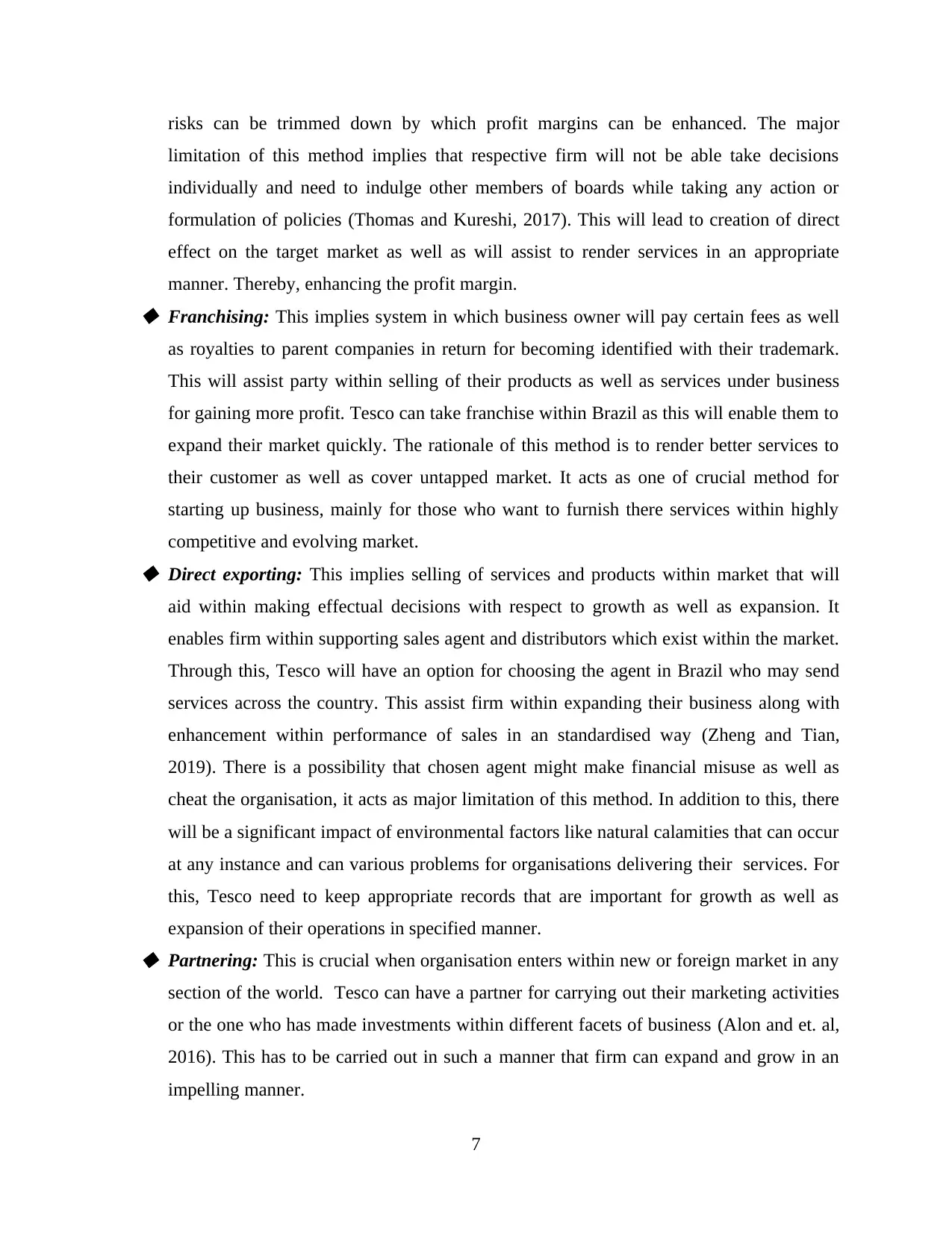
risks can be trimmed down by which profit margins can be enhanced. The major
limitation of this method implies that respective firm will not be able take decisions
individually and need to indulge other members of boards while taking any action or
formulation of policies (Thomas and Kureshi, 2017). This will lead to creation of direct
effect on the target market as well as will assist to render services in an appropriate
manner. Thereby, enhancing the profit margin. Franchising: This implies system in which business owner will pay certain fees as well
as royalties to parent companies in return for becoming identified with their trademark.
This will assist party within selling of their products as well as services under business
for gaining more profit. Tesco can take franchise within Brazil as this will enable them to
expand their market quickly. The rationale of this method is to render better services to
their customer as well as cover untapped market. It acts as one of crucial method for
starting up business, mainly for those who want to furnish there services within highly
competitive and evolving market. Direct exporting: This implies selling of services and products within market that will
aid within making effectual decisions with respect to growth as well as expansion. It
enables firm within supporting sales agent and distributors which exist within the market.
Through this, Tesco will have an option for choosing the agent in Brazil who may send
services across the country. This assist firm within expanding their business along with
enhancement within performance of sales in an standardised way (Zheng and Tian,
2019). There is a possibility that chosen agent might make financial misuse as well as
cheat the organisation, it acts as major limitation of this method. In addition to this, there
will be a significant impact of environmental factors like natural calamities that can occur
at any instance and can various problems for organisations delivering their services. For
this, Tesco need to keep appropriate records that are important for growth as well as
expansion of their operations in specified manner. Partnering: This is crucial when organisation enters within new or foreign market in any
section of the world. Tesco can have a partner for carrying out their marketing activities
or the one who has made investments within different facets of business (Alon and et. al,
2016). This has to be carried out in such a manner that firm can expand and grow in an
impelling manner.
7
limitation of this method implies that respective firm will not be able take decisions
individually and need to indulge other members of boards while taking any action or
formulation of policies (Thomas and Kureshi, 2017). This will lead to creation of direct
effect on the target market as well as will assist to render services in an appropriate
manner. Thereby, enhancing the profit margin. Franchising: This implies system in which business owner will pay certain fees as well
as royalties to parent companies in return for becoming identified with their trademark.
This will assist party within selling of their products as well as services under business
for gaining more profit. Tesco can take franchise within Brazil as this will enable them to
expand their market quickly. The rationale of this method is to render better services to
their customer as well as cover untapped market. It acts as one of crucial method for
starting up business, mainly for those who want to furnish there services within highly
competitive and evolving market. Direct exporting: This implies selling of services and products within market that will
aid within making effectual decisions with respect to growth as well as expansion. It
enables firm within supporting sales agent and distributors which exist within the market.
Through this, Tesco will have an option for choosing the agent in Brazil who may send
services across the country. This assist firm within expanding their business along with
enhancement within performance of sales in an standardised way (Zheng and Tian,
2019). There is a possibility that chosen agent might make financial misuse as well as
cheat the organisation, it acts as major limitation of this method. In addition to this, there
will be a significant impact of environmental factors like natural calamities that can occur
at any instance and can various problems for organisations delivering their services. For
this, Tesco need to keep appropriate records that are important for growth as well as
expansion of their operations in specified manner. Partnering: This is crucial when organisation enters within new or foreign market in any
section of the world. Tesco can have a partner for carrying out their marketing activities
or the one who has made investments within different facets of business (Alon and et. al,
2016). This has to be carried out in such a manner that firm can expand and grow in an
impelling manner.
7
⊘ This is a preview!⊘
Do you want full access?
Subscribe today to unlock all pages.

Trusted by 1+ million students worldwide
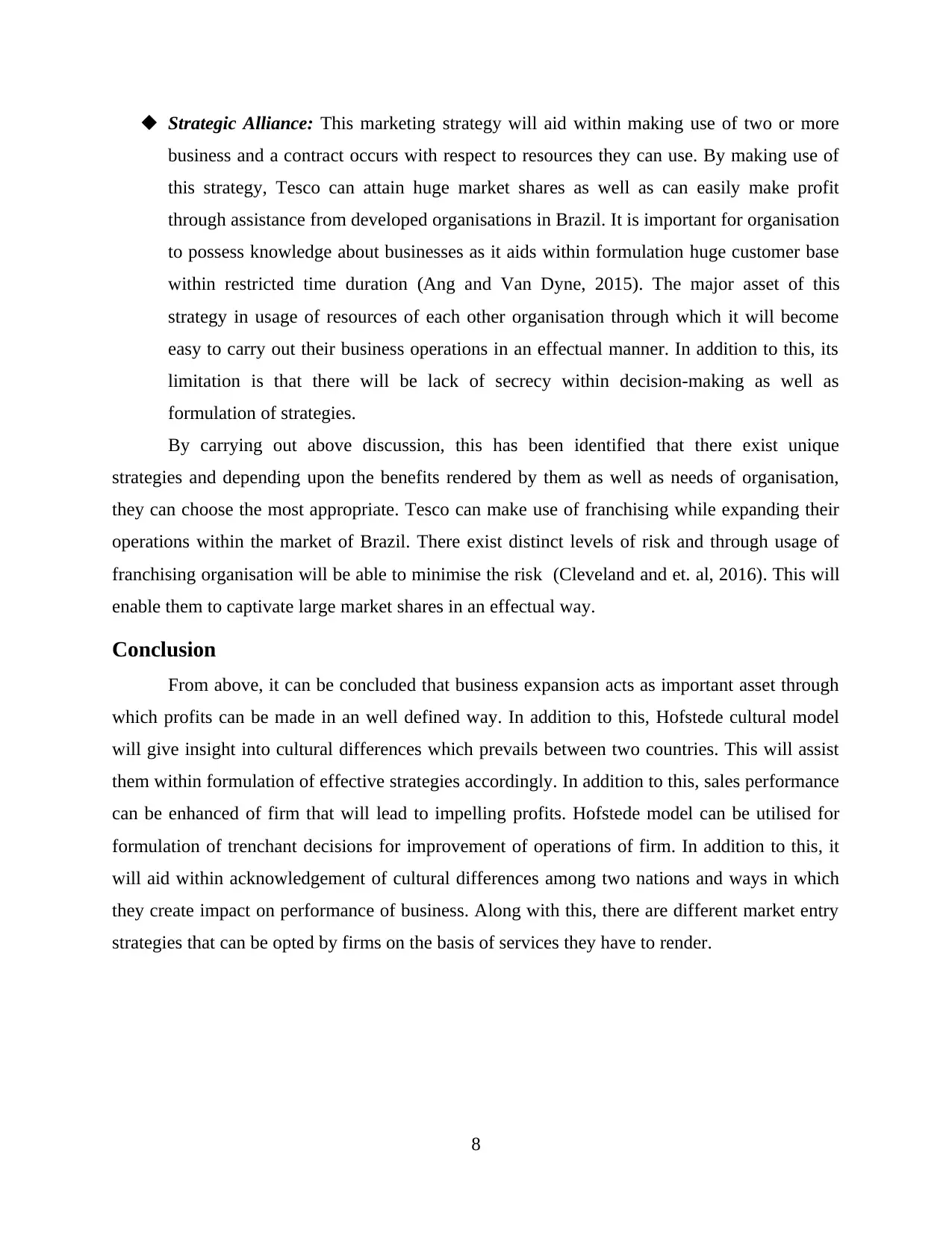
Strategic Alliance: This marketing strategy will aid within making use of two or more
business and a contract occurs with respect to resources they can use. By making use of
this strategy, Tesco can attain huge market shares as well as can easily make profit
through assistance from developed organisations in Brazil. It is important for organisation
to possess knowledge about businesses as it aids within formulation huge customer base
within restricted time duration (Ang and Van Dyne, 2015). The major asset of this
strategy in usage of resources of each other organisation through which it will become
easy to carry out their business operations in an effectual manner. In addition to this, its
limitation is that there will be lack of secrecy within decision-making as well as
formulation of strategies.
By carrying out above discussion, this has been identified that there exist unique
strategies and depending upon the benefits rendered by them as well as needs of organisation,
they can choose the most appropriate. Tesco can make use of franchising while expanding their
operations within the market of Brazil. There exist distinct levels of risk and through usage of
franchising organisation will be able to minimise the risk (Cleveland and et. al, 2016). This will
enable them to captivate large market shares in an effectual way.
Conclusion
From above, it can be concluded that business expansion acts as important asset through
which profits can be made in an well defined way. In addition to this, Hofstede cultural model
will give insight into cultural differences which prevails between two countries. This will assist
them within formulation of effective strategies accordingly. In addition to this, sales performance
can be enhanced of firm that will lead to impelling profits. Hofstede model can be utilised for
formulation of trenchant decisions for improvement of operations of firm. In addition to this, it
will aid within acknowledgement of cultural differences among two nations and ways in which
they create impact on performance of business. Along with this, there are different market entry
strategies that can be opted by firms on the basis of services they have to render.
8
business and a contract occurs with respect to resources they can use. By making use of
this strategy, Tesco can attain huge market shares as well as can easily make profit
through assistance from developed organisations in Brazil. It is important for organisation
to possess knowledge about businesses as it aids within formulation huge customer base
within restricted time duration (Ang and Van Dyne, 2015). The major asset of this
strategy in usage of resources of each other organisation through which it will become
easy to carry out their business operations in an effectual manner. In addition to this, its
limitation is that there will be lack of secrecy within decision-making as well as
formulation of strategies.
By carrying out above discussion, this has been identified that there exist unique
strategies and depending upon the benefits rendered by them as well as needs of organisation,
they can choose the most appropriate. Tesco can make use of franchising while expanding their
operations within the market of Brazil. There exist distinct levels of risk and through usage of
franchising organisation will be able to minimise the risk (Cleveland and et. al, 2016). This will
enable them to captivate large market shares in an effectual way.
Conclusion
From above, it can be concluded that business expansion acts as important asset through
which profits can be made in an well defined way. In addition to this, Hofstede cultural model
will give insight into cultural differences which prevails between two countries. This will assist
them within formulation of effective strategies accordingly. In addition to this, sales performance
can be enhanced of firm that will lead to impelling profits. Hofstede model can be utilised for
formulation of trenchant decisions for improvement of operations of firm. In addition to this, it
will aid within acknowledgement of cultural differences among two nations and ways in which
they create impact on performance of business. Along with this, there are different market entry
strategies that can be opted by firms on the basis of services they have to render.
8
Paraphrase This Document
Need a fresh take? Get an instant paraphrase of this document with our AI Paraphraser
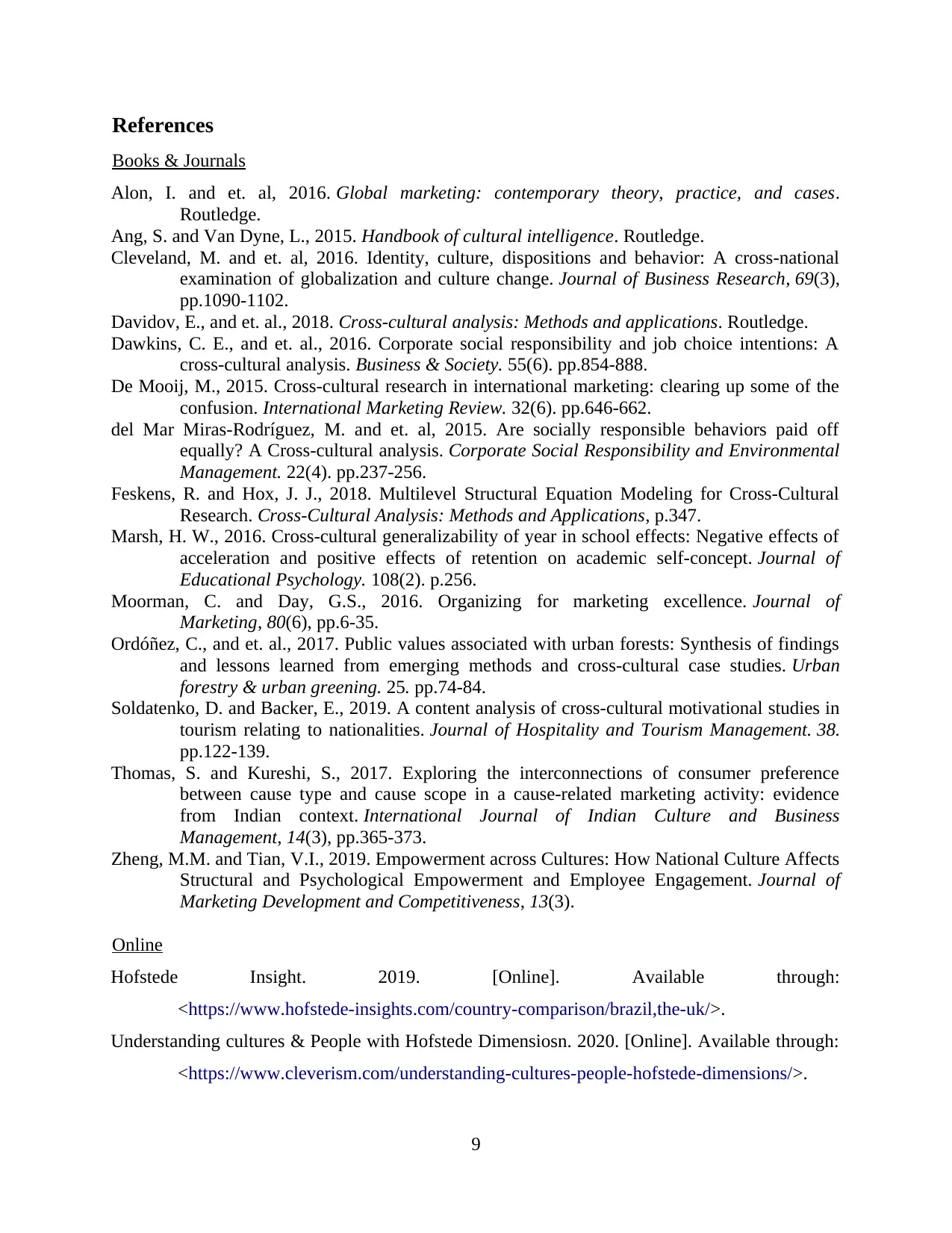
References
Books & Journals
Alon, I. and et. al, 2016. Global marketing: contemporary theory, practice, and cases.
Routledge.
Ang, S. and Van Dyne, L., 2015. Handbook of cultural intelligence. Routledge.
Cleveland, M. and et. al, 2016. Identity, culture, dispositions and behavior: A cross-national
examination of globalization and culture change. Journal of Business Research, 69(3),
pp.1090-1102.
Davidov, E., and et. al., 2018. Cross-cultural analysis: Methods and applications. Routledge.
Dawkins, C. E., and et. al., 2016. Corporate social responsibility and job choice intentions: A
cross-cultural analysis. Business & Society. 55(6). pp.854-888.
De Mooij, M., 2015. Cross-cultural research in international marketing: clearing up some of the
confusion. International Marketing Review. 32(6). pp.646-662.
del Mar Miras‐Rodríguez, M. and et. al, 2015. Are socially responsible behaviors paid off
equally? A Cross‐cultural analysis. Corporate Social Responsibility and Environmental
Management. 22(4). pp.237-256.
Feskens, R. and Hox, J. J., 2018. Multilevel Structural Equation Modeling for Cross-Cultural
Research. Cross-Cultural Analysis: Methods and Applications, p.347.
Marsh, H. W., 2016. Cross-cultural generalizability of year in school effects: Negative effects of
acceleration and positive effects of retention on academic self-concept. Journal of
Educational Psychology. 108(2). p.256.
Moorman, C. and Day, G.S., 2016. Organizing for marketing excellence. Journal of
Marketing, 80(6), pp.6-35.
Ordóñez, C., and et. al., 2017. Public values associated with urban forests: Synthesis of findings
and lessons learned from emerging methods and cross-cultural case studies. Urban
forestry & urban greening. 25. pp.74-84.
Soldatenko, D. and Backer, E., 2019. A content analysis of cross-cultural motivational studies in
tourism relating to nationalities. Journal of Hospitality and Tourism Management. 38.
pp.122-139.
Thomas, S. and Kureshi, S., 2017. Exploring the interconnections of consumer preference
between cause type and cause scope in a cause-related marketing activity: evidence
from Indian context. International Journal of Indian Culture and Business
Management, 14(3), pp.365-373.
Zheng, M.M. and Tian, V.I., 2019. Empowerment across Cultures: How National Culture Affects
Structural and Psychological Empowerment and Employee Engagement. Journal of
Marketing Development and Competitiveness, 13(3).
Online
Hofstede Insight. 2019. [Online]. Available through:
<https://www.hofstede-insights.com/country-comparison/brazil,the-uk/>.
Understanding cultures & People with Hofstede Dimensiosn. 2020. [Online]. Available through:
<https://www.cleverism.com/understanding-cultures-people-hofstede-dimensions/>.
9
Books & Journals
Alon, I. and et. al, 2016. Global marketing: contemporary theory, practice, and cases.
Routledge.
Ang, S. and Van Dyne, L., 2015. Handbook of cultural intelligence. Routledge.
Cleveland, M. and et. al, 2016. Identity, culture, dispositions and behavior: A cross-national
examination of globalization and culture change. Journal of Business Research, 69(3),
pp.1090-1102.
Davidov, E., and et. al., 2018. Cross-cultural analysis: Methods and applications. Routledge.
Dawkins, C. E., and et. al., 2016. Corporate social responsibility and job choice intentions: A
cross-cultural analysis. Business & Society. 55(6). pp.854-888.
De Mooij, M., 2015. Cross-cultural research in international marketing: clearing up some of the
confusion. International Marketing Review. 32(6). pp.646-662.
del Mar Miras‐Rodríguez, M. and et. al, 2015. Are socially responsible behaviors paid off
equally? A Cross‐cultural analysis. Corporate Social Responsibility and Environmental
Management. 22(4). pp.237-256.
Feskens, R. and Hox, J. J., 2018. Multilevel Structural Equation Modeling for Cross-Cultural
Research. Cross-Cultural Analysis: Methods and Applications, p.347.
Marsh, H. W., 2016. Cross-cultural generalizability of year in school effects: Negative effects of
acceleration and positive effects of retention on academic self-concept. Journal of
Educational Psychology. 108(2). p.256.
Moorman, C. and Day, G.S., 2016. Organizing for marketing excellence. Journal of
Marketing, 80(6), pp.6-35.
Ordóñez, C., and et. al., 2017. Public values associated with urban forests: Synthesis of findings
and lessons learned from emerging methods and cross-cultural case studies. Urban
forestry & urban greening. 25. pp.74-84.
Soldatenko, D. and Backer, E., 2019. A content analysis of cross-cultural motivational studies in
tourism relating to nationalities. Journal of Hospitality and Tourism Management. 38.
pp.122-139.
Thomas, S. and Kureshi, S., 2017. Exploring the interconnections of consumer preference
between cause type and cause scope in a cause-related marketing activity: evidence
from Indian context. International Journal of Indian Culture and Business
Management, 14(3), pp.365-373.
Zheng, M.M. and Tian, V.I., 2019. Empowerment across Cultures: How National Culture Affects
Structural and Psychological Empowerment and Employee Engagement. Journal of
Marketing Development and Competitiveness, 13(3).
Online
Hofstede Insight. 2019. [Online]. Available through:
<https://www.hofstede-insights.com/country-comparison/brazil,the-uk/>.
Understanding cultures & People with Hofstede Dimensiosn. 2020. [Online]. Available through:
<https://www.cleverism.com/understanding-cultures-people-hofstede-dimensions/>.
9
1 out of 11
Related Documents
Your All-in-One AI-Powered Toolkit for Academic Success.
+13062052269
info@desklib.com
Available 24*7 on WhatsApp / Email
![[object Object]](/_next/static/media/star-bottom.7253800d.svg)
Unlock your academic potential
Copyright © 2020–2026 A2Z Services. All Rights Reserved. Developed and managed by ZUCOL.





